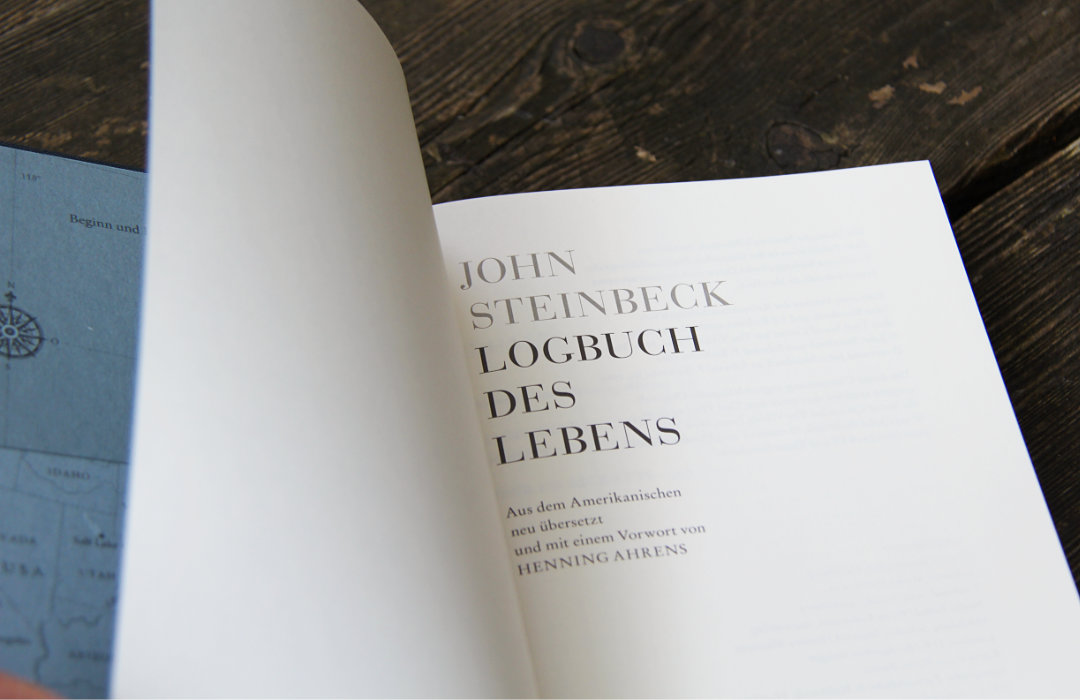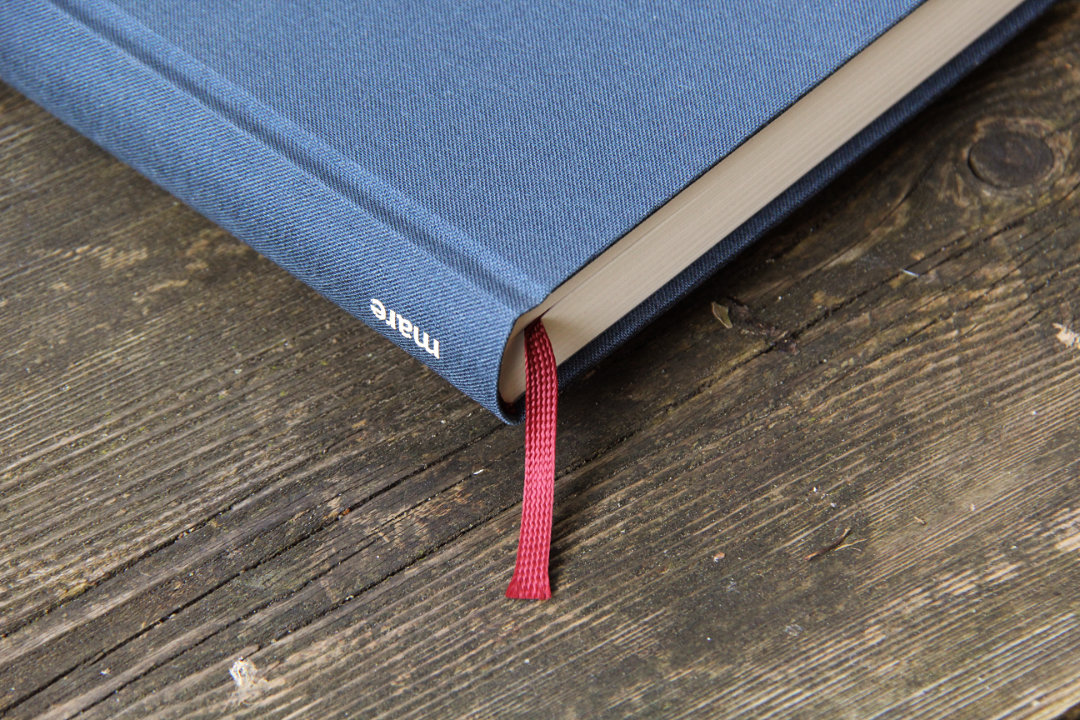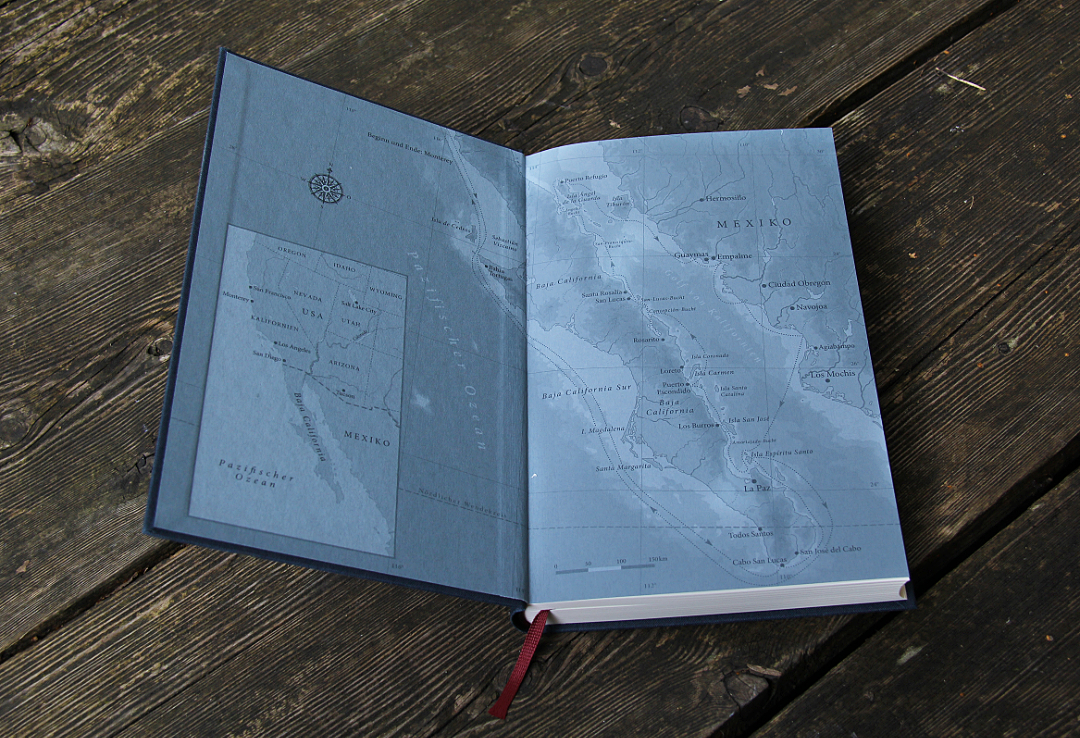The Log from the Sea of Cortez • John Steinbeck

Each year, two new books are added to the mare Klassiker series. And every time, I eagerly await what new gem will join this beautiful collection. I was absolutely delighted by The Toilers of the Sea by Victor Hugo, which was released earlier this year. What lies behind John Steinbeck’s The Log from the Sea of Cortez is once again a very typical book in the style of the mare publishing house: a reading pleasure full of sea and nature, but also something with that special touch.

In early 1940, John Steinbeck, together with his friend Ed Ricketts, set out aboard a fishing boat to explore the coast of Baja California and its marine life. Ed Ricketts was a marine biologist, and Steinbeck shared his enthusiasm for the ocean’s creatures. The two decided to spend six weeks exploring the Gulf of California. They cruised along the Gulf’s coast in their sardine boat, stopping at several Mexican villages and conducting numerous collecting expeditions, during which they gathered, preserved, and classified countless marine species from the littoral zone—the coastal area shaped by the tides.
At first, this might sound like a simple travelogue. But quite the opposite is true: Steinbeck delivers a wonderful account of the group’s adventures. With humor and ease, he writes in a lively, highly readable, and entertaining style. He describes the circumstances, recounts interesting encounters, and reflects philosophically on God and the world, on land and people. Naturally, he also captures the beautiful landscape, the biodiversity, and the impressions gathered in what was then still a largely unexplored natural world. Today, Baja California is a popular and crowded travel destination. Back then, however, the Gulf region was poor, sparsely visited, and dotted with stretches of uninhabited wilderness. Steinbeck often writes about the people they met—humble Mexicans or poor Indigenous villagers—the small towns they stopped in, and, of course, their extensive collecting expeditions.

Just reading about the kind of equipment and the modest boat they took is an adventure in itself. This was by no means a serious scientific expedition. It was more of an adventure—a dream fulfilled, an escape from reality, a retreat from the looming Second World War aboard a small vessel, and a plunge into the world of the sea and its creatures. Often, it feels like a mix between scientific exploration, adventure, and a holiday trip. Steinbeck emphasizes that for him, marine biology is more than the mere collection and classification of species. What matters is the larger picture: the individual animals, their habitat, the surrounding landscape, and the philosophical perspective on this ever-changing world. He conveys this viewpoint wonderfully throughout the narrative. He describes the collecting expeditions and the species they found, even listing them at times. Yet it never becomes tedious—because suddenly Steinbeck digresses and gracefully ties it all back to humankind, to our thoughts, questioning things that appear in entirely different contexts but unexpectedly connect to this small world of the littoral zone. I found this especially enjoyable.
“If the water is warm and there is food in abundance, many creatures lapse into a slothful, unproductive contentment. For man, at least, this is true. Strength, intelligence, and versatility arise only out of adversity. Tacitus suggested in his Annals that the Roman armies should lure the Germanic tribes into a warm region with abundant food. This, he wrote, would destroy them most quickly. If this is true biologically, what then will become of the well-fed and comfortable inhabitants of a perfect future state?” (p. 249)
The entire book has a relaxed tone, and I really enjoy Steinbeck’s worldview—especially his ability not to take himself or his work too seriously. He often recounts humorous anecdotes, describing quite authentically how the small all-male crew enjoyed their fair share of cold beers, bonded as a group, developed quirks, and faced plenty of mishaps. Through these impressions—combined with descriptions of the landscape, marine life, and small coastal villages—a vivid picture of the journey emerges. This is precisely the kind of book that defines the mare publishing house. Dangerous Work: Diary of an Arctic Adventure left me with similar impressions. Or the illustrated volume Antarctic Wilderness. After reading books like these, one feels as though one has taken a small journey oneself. Of course, it can’t compare to actually setting out on such an expedition—but for a short while, these books transport you into another, beautiful world: into a romantic, untouched nature. Without enduring any hardships, one can escape daily life completely and unwind. And these books awaken both the memory and the longing for the sea.

John Steinbeck is one of the most successful American authors of the twentieth century. In 1940, he received the Pulitzer Prize for his socially critical novel The Grapes of Wrath and in 1962 the Nobel Prize in Literature. Several of his works, such as East of Eden, were adapted into films. He is undoubtedly one of the great and worthwhile authors in the literary ocean of the 20th century. Beyond his major works, this book is certainly a hidden gem and a true rediscovery. His social criticism echoes throughout its pages.
“Giving can produce the same sense of superiority as hoarding, and philanthropy may be only a spiritual form of greed.” (p. 360)
The final sixty pages of the book are devoted to a eulogy for his friend Ed Ricketts, who had accompanied him on this journey and died in an accident in 1948. At first, this sudden ending and shift in context surprised me. Yet this section, too, maintains a casual tone, filled with anecdotes, humor, and humanity, painting a vivid portrait of a close and fascinating friend. Just like the travelogue itself, it was a pleasure to read—even if it feels a bit oddly appended to the main text. There we also learn that another similar research trip had originally been planned—and that Steinbeck and Ricketts were quite the hard-drinking fellows, which makes them all the more endearing.

As usual, this edition is of high quality—with thread binding, ribbon bookmark, and a smooth linen cover. The endpapers include a map tracing the route Steinbeck traveled. I found this very helpful, as it gives the reader a general sense of where the little ship is at any given moment. Overall, everything here is just as excellent as one expects from the other volumes in the series.

Conclusion: The Log from the Sea of Cortez is an entertaining and lighthearted travel narrative that transports the reader into the wild and uncharted world of Baja California in the 1940s. Steinbeck skillfully weaves together descriptions of the landscape, the Mexican locals, the sea, and the myriad marine creatures they collected with philosophical reflections and a questioning view of the modern world. This book is an excursion into the realm of the sea—an adventure and a journey through a maritime world—exactly what I have come to expect and appreciate from the mare Klassiker series.
Book information: The Log from the Sea of Cortez • John Steinbeck • mare Verlag • 274 pages • ISBN 9783866482593

Habe den Mare Verlag erst vor verhältnismäßig kurzer Zeit für mich (u.a. durch das Buch von Sir Arthur Conan Doyle) entdeckt und bin von Aufmachung und Titelauswahl sehr angetan. Bis auf wenige Ausnahmen wird da sicher ein Großteil in mein Regal wandern. Und Steinbeck ist – egal, wo veröffentlicht – für mich eh ein Muss, zumal ich “Logbuch des Lebens” noch nicht kenne. Danke für den Hinweis und die gelungene Besprechung. Das kommt gleich in meinen Warenkorb.
Falls Dich übrigens die Thematik Meer auch außerhalb des Mare Verlags interessieren sollte, werfe mal einen näheren Blick auf “Der Goldsucher” von J.M.G. Le Clézio. Eines der schönsten und exotischsten Bücher, die ich bis dato gelesen habe und auf einer Ebene mit den Klassikern von Stevenson, Cooper und Co.
Beste Grüße und schönen Abend
Stefan
Lieber Stefan,
der Mare Verlag ist super, die Klassiker Reihe hab ich komplett und die Bücher sind einfach top. Inhaltlich wie von der Aufmachung. Neben den Hanser Klassikern meine absolute Lieblingsreihe. So schöne Bücher findet man nicht so leicht. Zum Start hol dir unbedingt die beiden Bücher von Guy de Maupassant und “Die Arbeiter des Meeres” von Victor Hugo. Das sind echte Knaller. Das optisch schönste Buch ist “Von Ozean zu Ozean” von Kipling. Eine wunderschöne Ausgabe.
“Der Goldsucher” hört sich echt gut an. Vielen Dank für den Tipp. Das kommt auf meine Liste.
Liebe Grüße
Tobi
Ja, du hast mir mit Deinem Blog und speziell halt mit den Mare-Besprechungen den Mund ziemlich wässrig gemacht. Obwohl ich den ein oder anderen Titel bereits in älterer Auflage im Regal stehen habe, spricht das mein Buchliebhaberherz einfach an. Die Hanser-Klassiker kenne ich bereits und nenne schon mehrere mein Eigen. Wunderschön, wobei mir hier vor allem “St. Ives” von Stevenson gefällt.
Die Tipps nehme ich doch gerne mit. Die beiden Maupaussants waren eh schon auf dem Wunschzettel, Hugo kommt jetzt gleich mal dazu. Bei Kipling ist erstmal “Kim” von Hanser fällig.
Wünsche Dir viel Spaß, für den Fall, dass du Le Clézio lesen solltest. Er hat ja 2008 den Nobelpreis bekommen und ich – damals noch Azubi im Buchhandel – habe da einfach mal zugegriffen. Ist mir bis heute nachhaltig in Erinnerung geblieben.
Liebe Grüße zurück
Stefan
Huhu
Steinbeck zählt zu meinen absoluten Lieblingsauroren ??? ich liebe seine Bücher und finde es echt cool, dass dir sein Buch so zugesagt hat! Hast du auch andere Sachen von ihm gelesen?
Lg Tinka
Liebe Tinka,
von Steinbeck ist das mein erstes Buch. Ich bin mir nicht sicher, vom Klappentext ziehen seine anderen Bücher einfach nicht so richtig bei mir. Welches Buch kannst du denn besonders empfehlen?
Liebe Grüße
Tobi
Hm…also ich mochte eigentlich alles von ihm :) jaaaaaaa! Ich bin ein Fan gg aber besonders in Erinnerung geblieben sind mir folgende Werke: Die Straße der Ölsardinen (ein Buch über Außenseiter und alternative – living, ich mag sowas ja total gerne), dann Tortilla Flat (liest sich total schnell und hat nur wenige Seiten) und der gesellschaftskritische Roman Früchte des Zorns. Bei Steinbeck ist es halt so, dass seine Bücher über den Unterhaltungswert gehen, sie sagen immer etwas aus und sind meist kritisch. Sein Faible für die Armen und Unterdrückten in der Gesellschaft ist in allen seinen Werken zu finden. Das muss man halt mögen. Wenn jmd lieber romantische Bücher liest, Liebesschnulzen und Heiterkeit bevorzugt, der ist bei Steinbeck falsch. Ich mag aber politisch affine Bücher und irgendwie könnte ich bei Steinbech fast jeden Satz in meine Zitate-Liste aufnehmen ^^
Moin,
in der Schule hat man bei mir literarisch einiges vergeigt. Ich weiss gar nicht wie oft ich Die Weber, Mutter Courage, Die Leiden des jungen Werther oder den Bahnwärter Thiel lesen musste. Da musste dann jeder Winkel durchleuchtet werden, ob und was mit der Autor sagen will. Spass am Lesen hat das nicht gerade gebracht. So sind einige Autoren bei mir regelrecht verbrannt. Auch im Englischen (da lese ich Shakespeare sehr gerne, besonders Der widerspenstigen Zähmung, aber Shakespear MUSSTE ich ja auch nie lesen. Dafür aber Jack London, Jack London und dann noch Jack London. Und John Steinbeck – The Pearl.
Nun hat mich deine Besprechung dazu gebracht, es doch mal mit John Steinbeck zu probieren, nachdem mir Flauberts Mde Bovary recht viel Spass gemacht hat. Also flugs den nächsten virtuellen Buchladen aufgesucht – und ach herrje, Logbuch des Lebens gibt es nicht als eBook :( Klar, die Perle, die gibt es. Will ich aber nicht. Soll anscheinend nicht sein. Aber der eSuB ist ja auch groß genug und so werde ich mir (vielleivht) die Hexenholzkrone zu Gemüte führen, onwohl ich mir vorgenommen hatte, auf den 2ten Teil zu warten.
Gruss
Huebi
Lieber Huebi,
also mit der Schule hatte ich Glück, da wurde ich nur mit Georg Büchner gequält und sonst weitgehend verschont. Das kann ich gut verstehen, dass du da dann keine Lust mehr auf die Autoren und Bücher hast. Ein Glück, dass man beim entspannten Lesen keine Analyse machen muss und das Buch bis zum letzten Detail ausquetschen muss. Dieses Buch von Steinbeck ist auf jeden Fall eine sehr entspannte und unterhaltsame Lektüre. Da ist keine Spur von hohem literarischen Anspruch.
Mit deinen eBooks hast du ja echt kein Glück. Vielleicht solltest du dir doch einen handfesten zweit SuB zulegen? ;)
Herzliche Grüße
Tobi
Das Buch schaut wirklich faszinierend aus!
Neri, Leselaunen
Hallo! Dieses Buch habe ich noch nie gelesen, auch wenn ich John Steinbeck einen absoluten Literatur-Meister finde! Danke für den Bericht, jetzt weiß ich wonach ich das nächste mal in der Bücherei suchen soll.
Viele Grüße, Sebastian
Das Buch schaut, obwohl ich nicht der Steinbeck Fan bin, echt interessant aus.
LG Joel von Büchervergleich.org
Danke für die Präsentation
Hallo Tobi,
durch deinen Blog bin ich auf den mare-Verlag gestoßen und habe mir als erstes das Logbuch zugelegt, weil Steinbeck einer meiner Liebligsautoren ist. Maupassant kommt wohl als nächstes. Jedoch ist der Stapel ungelesener Bücher in den letzten Monaten sehr gewachsen …
Danke für deine Tipps und vor allem auch für die ansprechenden Fotos!
Lieber Reiner,
der Mare Verlag ist sehr genial, dass kann ich Dir sagen. Die beiden Bücher von Maupassant sind meine absoluten Favoriten aus der Reihe. Wunderschöne Ausgaben mit perfektem Inhalt. Also wenn Du den Mare Verlag bisher nicht kennst, dann ist das sozusagen der worst-case für Deinen SuB ;)
Meine rezensierten Mare Bücher findest Du übrigens hier: Meer, ganz viel Meer von Mare auf Lesestunden
Herzliche Grüße und vielen Dank für Dein nettes Feedback
Tobi
Also, ich habe vor Jahren “Von Mäusen und Menschen” und “The Pearl” gelesen und fand beides furchtbar. Dem Aufenthalt meiner Tochter in Salinas verdanke ich nun den Mut, doch noch “Cannery Row” (das sowohl Englisch als auch Deutsch jahrelang auf meinen Regalen ruhte) zu lesen. Wie oben schon von Tinka beschrieben, diese tiefsinnige Reflexion über die Welt an sich und die Ausgegrenzten und dennoch nach anderen Maßstäben “Erfolgreichen” ist atemberaubend. Absolute Empfehlung … Logbuch des Lebens habe ich auch schon seit Jahren hier stehen (es ist ziemlich dick), aber nun fange ich es auch an … Steinbecks Vorfahren kommen übrigens hier aus der Nachbarschaft: aus Heiligenhaus bei Mettmann.